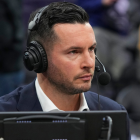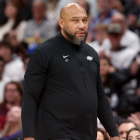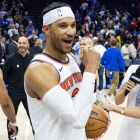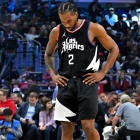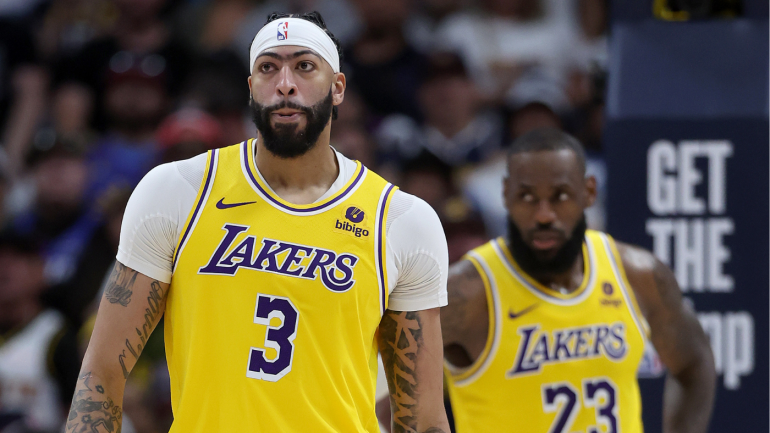
The Los Angeles Lakers had a very real chance to not only steal a game against the Denver Nuggets on Monday, but swing the entire series. They led by 20 in the third quarter. They are 28-14 at home, and a win would have given them home-court advantage in the series. A year ago, the Lakers won two series as underdogs because they swiped one of the first two games on the road and never lost at home. Would you have bet against LeBron James in a best-of-five series with three home games?
Instead, well, you've seen the final score by now. The Lakers blew a 20-point lead. They lost to Jamal Murray at the buzzer. Now, they're down 2-0 in the series. They've lost 10 in a row to the Nuggets as a whole. The daunting prospect of still needing to win a game in Denver looms over the rest of the series. The Lakers will get only two more tries. In NBA history, 449 teams have gained a 2-0 series lead. Only 33 of them have come back to win the series.
And yet, in many ways, the game felt familiar. The recent history of the Lakers-Nuggets rivalry has revolved around three close quarters followed by a crunch time bloodbath. Entering Monday, the Lakers and Nuggets had played a total of 18 clutch minutes since the beginning of the 2023 Western Conference Finals. Denver won those minutes by a whopping 32 points. In Game 2, the Nuggets won the final five minutes and eight seconds by 10 points. Time and time again, once the Nuggets decide they are ready to take the Lakers seriously, they blow them out of the water. Head coach Darvin Ham never knows what levers to pull in response.
It takes dozens of things going wrong to blow a 20-point third-quarter lead. You need bad shooting variance. You need a bad whistle. You need sloppy, isolated missteps that are the natural outcome of tense, playoff basketball games. But more than anything, you need strategic mistakes, and the Lakers made several of them. Here are the three biggest ones they made down the stretch to allow the Nuggets the chance they needed to complete the comeback:
The rotation
Spencer Dinwiddie played 13 minutes in Game 1. The Lakers lost those minutes by 12 points. Though his size carries defensive upside, he's lost too much of a step to defend in a series like this properly. Teams frequently leave him open from deep and dare him to shoot. His 3-point numbers in Los Angeles have generally been good. For his career, he's a 33.3% shooter from deep. All of that is more or less how his second-half minutes played out on Monday. He entered the game with the Lakers up 10. Roughly four minutes later, he left with the Lakers up five. The Nuggets didn't guard him. They didn't notice him on defense either.
Ham isn't exactly in an easy position here. The Lakers signed Gabe Vincent for exactly this series. They watched him defend Murray well in the Finals. He's made his shots in high-pressure playoff moments before. But Vincent missed most of the season. As a result, he never quite earned Ham's trust in the way the front office likely hoped. So he played just 15 minutes in this one. He wasn't great, and didn't make a shot. But he's at least a threat from deep and his defense this postseason has largely been good. Disperse those Dinwiddie minutes to Vincent and Austin Reaves, who played only 33 in Game 2, and the outcome is potentially different.
And then there's the higher stakes matter of when to play LeBron. James took a seat with 3:44 remaining in the third quarter for his typical second half rest. But Ham allowed him only one minute of reprieve before re-inserting him into the game. This did two things that would eventually come back to bite the Lakers. The first is that it left James visibly exhausted for the most important minutes of the game: the beginning of the fourth quarter, when Nikola Jokic traditionally takes his rest. The Nuggets lost 25 games all season... but only 14 of those losses saw Denver outscored during Jokic's minutes. In the other 11, Denver won the Jokic minutes but lost the game because of how badly their bench lost its own minutes. The key to beating Denver is winning these minutes. The Lakers lost the no-Jokic minutes by a point because James was gassed and Anthony Davis was out.
To address James' exhaustion, Ham ultimately removed him again when Jokic returned. Again, his absence was for less than two minutes, and the Nuggets made up four more points while he was out. Yes, having James on the court at the end of the third quarter helped, but it deprived the Lakers of their best chance of knocking the Nuggets out for good. If a rested James takes the court early in the fourth-quarter, their lead might have grown enough to be safe.
Going away from their best play
Look at how easy this looks...
The TNT broadcast told us when the second half began that James and Davis stayed on the court during halftime to work on their pick-and-roll. When the third quarter started, the Lakers proceeded to run that play, their best play, every single time down the court.
For five years, this has been their finishing move, their late-game checkmate to put a helpless opponent away. The Nuggets tried several coverages to slow it down. Jokic played a high-drop on the first video in that clip, so James snuck a pocket pass between the two defenders for the and-one. They blitzed the second, so James passed above them, giving Davis yet another easy layup over a too-small low-man (in this case, Murray). Jokic dropped lower on the third, and Murray shuffled over to help, so James nailed Reaves for an open 3.
Properly spaced, this is one of the best plays in basketball. There's no good answer to it unless you have two seven-footers that can switch (good luck with that). Go over the screen and James beats you to the rim. Go under, and now that he's evolved into a lethal shooter, he buries you from deep. Defend at the level of the screen and you're begging for a lob. Drop and you give James a head of steam to potentially draw a foul. Bring in a third defender and one of the best defenders in NBA history finds his shooter. It's an unguardable weapon that the Lakers are comfortable spamming when the need arises. Behind this play, the Lakers took their 15-point halftime lead up to 20.
And then? They... just... stopped... running it. Not fully, but they didn't run it anywhere close to often enough. James started using Rui Hachimura as his dance partner, often stashing Davis, the worst shooter in the starting lineup, in the strong side corner, where help could more easily arrive. D'Angelo Russell became a more frequent ball-handler as well, but his limited explosiveness gives him weaknesses that James doesn't have, especially against a Denver team that wins through discipline and intelligence rather than pure athletic skill.
Are there explanations for why the Lakers made this call? Sure. James and Davis were both exhausted by the end of the game. Maybe they lacked the stamina to abuse their best play as aggressively as they would have liked. The Nuggets also adjusted by switching that play more aggressively, so that when James got his screen, he ran into Aaron Gordon instead of Jokic. Ham had no response to this adjustment.
But in truth, it's a play the Lakers don't use often enough under any circumstances. For whatever reason, the Darvin Ham Lakers tend to get disorganized on offense and revert to isolation-ball far more often than the Frank Vogel versions did. The Lakers got sloppy down the stretch offensively when they'd found a play that consistently gave them easy points.
Not doubling Jokic
Before Game 2, Ham made an admission about defending Jokic that most coaches would secretly agree with. "It's like shit, I don't know what to do," he joked. To an extent, he's right. Jokic doesn't have a weakness. There's not a specific coverage that's going to stifle him. You're choosing between bad answers. It's just that Ham chose the worst answer down the stretch: he allowed Jokic to play one-on-one in the post.
Jokic scored three times in the final five minutes. Davis attempted to guard him one-on-one each time. Jokic shot just below 53% when guarded by Davis in last year's Western Conference Finals. It's a matchup he's completely comfortable in. He even managed to get Davis airborne on the final shot he took of the night, picking up an and-one for his troubles.
Ham did have an adjustment here, but not a successful one. On Denver's final two possessions of the game, the Lakers put James on Murray and switched his pick-and-roll with Jokic. Once Murray realized this, he took advantage to set up a quick jumper before the switch set-in that tied the score at 99. And then, on the final possession of the game, the Nuggets took the switch to get Davis on Murray on the perimeter. They cleared the strong side so Murray would be able to work one-on-one. He created just enough space over the exhausted Davis to drill the game-winner.
Was there necessarily a good answer to any of this? No. But it's worth noting that Nuggets not named Porter or Jokic did not make a single 3-pointer in Game 2. They obviously could've heated up if given the chance, but given the circumstances, some help on Denver's two best players likely would have been warranted. It's just easier to stomach losing on role-player 3-pointers when those shots haven't been falling all night.
Every Lakers player and coach bears some responsibility for the loss, but strategic mistakes are the single fastest way to get knocked out of the postseason. Simply put, Michael Malone out-coached Ham on Monday, and that robbed the Lakers of their best chance to win this series.














